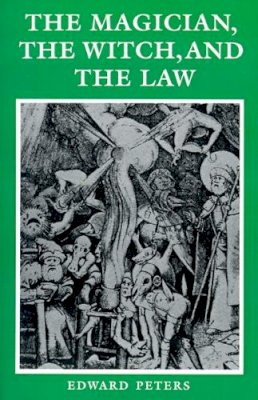7%OFF

Stock image for illustration purposes only - book cover, edition or condition may vary.
The Magician, the Witch, and the Law (The Middle Ages Series)
Edward Peters
€ 26.99
€ 25.04
FREE Delivery in Ireland
Description for The Magician, the Witch, and the Law (The Middle Ages Series)
Paperback. "Helps to place our understanding of medieval witchcraft into a broader context.. Sheds light on the various genres of literature in which magic was discussed."-Speculum Series: The Middle Ages Series. Num Pages: 234 pages, black & white illustrations. BIC Classification: VXWM; VXWT. Category: (G) General (US: Trade). Dimension: 229 x 152 x 15. Weight in Grams: 370.
In the early Middle Ages, magic was considered a practical science, requiring study and skill. But as European society became more articulate and self-conscious, the old tradition of magic as a science became associated with heresy and sorcery. Thereafter the Middle Ages knew no safe, learned magic that was not subject to accusation of diabolism in one form or another, and the magician, like the later witch, could be punished for both spiritual and temporal offenses. Through Peters's analysis of the legal, ecclesiastical, and literary responses to this problem, magic and witchcraft are located more accurately in the cultural context ... Read more
Show LessProduct Details
Publisher
University of Pennsylvania Press
Format
Paperback
Publication date
1982
Series
The Middle Ages Series
Condition
New
Weight
369g
Number of Pages
234
Place of Publication
Pennsylvania, United States
ISBN
9780812211016
SKU
V9780812211016
Shipping Time
Usually ships in 7 to 11 working days
Ref
99-1
About Edward Peters
Edward Peters is Henry Charles Lea Professor of History at the University of Pennsylvania. His publications include Heresy and Authority in Medieval Europe; The First Crusade; and, with Alan C. Kors, Witchcraft in Europe, 400-1700: A Documentary History, all available from the University of Pennsylvania Press.
Reviews for The Magician, the Witch, and the Law (The Middle Ages Series)
"Peters teases out of familiar tales of fear and fantasy a real picture of those who, in cell, court, and countryside, offered their sinister services to an increasingly credulous world."—History "Helps to place our understanding of medieval witchcraft into a broader context. . . . Sheds light on the various genres of literature in which magic was discussed."—Speculum
